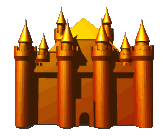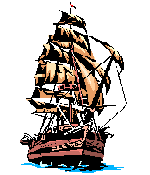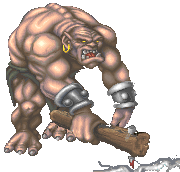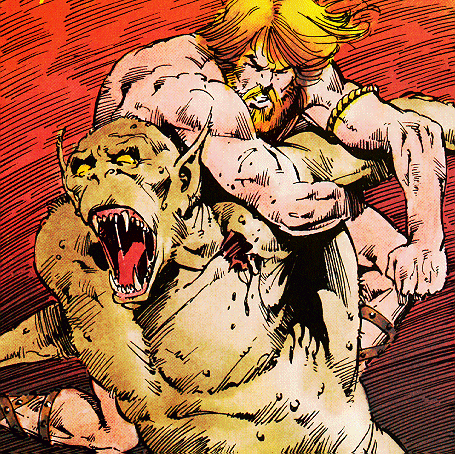 W
hen the celebration of the defeat of Grendel in Heorot
comes to an end, Beowulf, the son of Ecgtheow, has decided
it is time to return home to the land of the Geats. Having
been so well received by Hrothgar,
the king of the Danes,
Beowulf leaves with
joy and pride as the king refers to him
as the greatest hero of all men. Returning the
king's kind praise, he makes a promise that, if necessary,
he will always be ready to serve the king again in any
circumstances. This behavior of Beowulf's further shows his
honorable character.
W
hen the celebration of the defeat of Grendel in Heorot
comes to an end, Beowulf, the son of Ecgtheow, has decided
it is time to return home to the land of the Geats. Having
been so well received by Hrothgar,
the king of the Danes,
Beowulf leaves with
joy and pride as the king refers to him
as the greatest hero of all men. Returning the
king's kind praise, he makes a promise that, if necessary,
he will always be ready to serve the king again in any
circumstances. This behavior of Beowulf's further shows his
honorable character.
A fter the noble conversation between the two men, Beowulf is ready to depart from the Danish land. Not knowing how to thank Beowulf for his courageous assistance in battling the mighty Grendel and bringing back peace, the king gives him twelve precious gifts to take home. Among the gifts are gold, beautiful armor, horses, and many other treasures. However, the most valuable gift must be the splendid sword that not even Heoroweard, Hrothgar's nephew, has the prestige to own. Showing his respect for this incredible man one last time, the king kisses Beowulf farewell. Once all the troop members are on board, the ship sails away from the shore and slowly vanishes into the wide open waters.
 V
ery soon, the ship reaches the shore of the land of the
Geats, and Beowulf, along with his troop, is warmly welcomed by
his people. Setting foot on the soil, he rushes to see Hygelac,
the lord of the Geats. Once the lord learns of Beowulf's return,
he is much relieved to hear that his best warrior is safe and sound
after the dreadful battle with the deadly Grendel. When Beowulf
arrives at Hygelac's castle, he immediately reports to him of his
journey and adventure.
V
ery soon, the ship reaches the shore of the land of the
Geats, and Beowulf, along with his troop, is warmly welcomed by
his people. Setting foot on the soil, he rushes to see Hygelac,
the lord of the Geats. Once the lord learns of Beowulf's return,
he is much relieved to hear that his best warrior is safe and sound
after the dreadful battle with the deadly Grendel. When Beowulf
arrives at Hygelac's castle, he immediately reports to him of his
journey and adventure.
 T
he first thing Beowulf
talks about, of course, is his encounter
with Grendel. After bragging about
the good deed he does for the Scyldings,
he suddenly switches topics to the
marriage between Hrothgar's daughter, Freawaru, and
Ingeld,
the king of the Heatho-Bards.
Beowulf explains that this marriage is
intentionally arranged to bring about peace between the
Danes and the
Heatho-Bards. However,
Beowulf himself is not quite optimistic
about this plan since the two tribes were enemies not too long ago.
Realizing that the king isn't interested in this, he returns to
his story about the fight with Grendel.
T
he first thing Beowulf
talks about, of course, is his encounter
with Grendel. After bragging about
the good deed he does for the Scyldings,
he suddenly switches topics to the
marriage between Hrothgar's daughter, Freawaru, and
Ingeld,
the king of the Heatho-Bards.
Beowulf explains that this marriage is
intentionally arranged to bring about peace between the
Danes and the
Heatho-Bards. However,
Beowulf himself is not quite optimistic
about this plan since the two tribes were enemies not too long ago.
Realizing that the king isn't interested in this, he returns to
his story about the fight with Grendel.
 C
ontinuing his story, Beowulf
describes how fatal Grendel is when
he swallows the entire body of a warrior. Fortunately, Beowulf
himself is not at a disadvantage at all. He tells Hygelac
how easily he killed the monster by ripping off his right hand with his
own powerful arm, which has the strength of thirty men. Then, he
goes on to talk about the fight with Grendel's mother, who only
wanted to take
C
ontinuing his story, Beowulf
describes how fatal Grendel is when
he swallows the entire body of a warrior. Fortunately, Beowulf
himself is not at a disadvantage at all. He tells Hygelac
how easily he killed the monster by ripping off his right hand with his
own powerful arm, which has the strength of thirty men. Then, he
goes on to talk about the fight with Grendel's mother, who only
wanted to take
revenge. Again, he briefly summarizes the entire
action by simply telling the lord that he cut off her head, thus
bringing back peace to the Danes.
O nce Beowulf finishes telling his adventure, he immediately gives Hygelac all the treasures and gifts he has received from Hrothgar. The lord, being extremely grateful and proud of his nephew's accomplishment, has decided to grant him more awards including seven thousand hides of land and a throne. Similar in custom to the Danes, the sword represents a higher status and esteem, and Beowulf is once again being honored as a great hero when Hygelac awards him with a golden sword, the best treasure of the Geats.